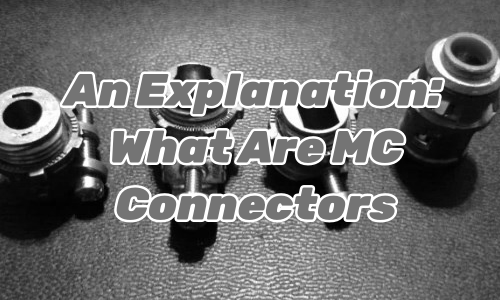With the increasing complexity and diversification of electronic devices, traditional connector designs have been unable to meet the needs of high density and high performance. Therefore, the MC connector came into being, providing a more flexible and efficient solution for modern technology applications.
However, MC connectors are not just a simple tool for connecting cables. They are an innovative product that combines advanced materials, engineering, and electrical technology to provide critical support for the reliability and performance of electronic devices.
This article will delve into what MC connectors are, how they work, and their key role in various applications. Let's first understand what mc connectors are.
What Are MC Connectors

I'm not entirely sure what you mean by "MC connectors" as the term "MC" could refer to various things depending on the context.
-
MC Connectors in Electrical Wiring: In electrical wiring, "MC" can refer to Metal-Clad (MC) cable connectors. These connectors are used to secure and ground Metal-Clad cables, which are commonly used for commercial and industrial applications. MC connectors help to protect the wiring connections and ensure electrical safety. They are typically made of metal and provide a secure and reliable connection for the MC cables.
-
MC Connectors in Networking: In networking jargon, "MC connectors" could refer to Multi-Channel connectors. These connectors are used in data transmission applications to support multiple data channels or communication lines within a single connector. They are commonly found in high-speed data connections and networking equipment.
If you have a specific context in mind or more details about where you encountered the term "MC connectors," please provide more information so I can offer a more accurate explanation.
Quick Answer: How Does An MC Connector Work
An MC connector typically refers to a type of Metal-Clad (MC) cable connector used in electrical wiring. MC connectors secure Metal-Clad cables and provide strain relief while ensuring a secure electrical connection. They are designed to ground the metal casing of the cable to protect against electrical faults and ensure safety in commercial and industrial applications.
3 Types of MC Cable Connectors
There are several types of connectors used with Metal-Clad (MC) cables in electrical installations. Here are three common types of MC cable connectors:
-
Straight Connector: Straight connectors are used to connect Metal-Clad cables to electrical boxes, devices, or enclosures. These connectors provide a secure and tight connection between the cable and the electrical component.
-
90-Degree Connector: 90-degree connectors, also known as elbow connectors, are used when a right angle bend is required in the cable run. They help to route the MC cable smoothly around corners while maintaining a clean and organized wiring layout.
-
Compression Connector: Compression connectors provide a watertight and secure connection for Metal-Clad cables. These connectors use compression fittings to tightly seal the ends of the cable, protecting against moisture and ensuring the integrity of the electrical connection.
These are just a few examples of MC cable connectors commonly used in electrical installations. The specific type of connector used will depend on the requirements of the installation and the layout of the wiring system.
What Is the MC Cable Connector used for
Metal-Clad (MC) cable connectors are essential components used in electrical wiring installations to secure and protect Metal-Clad cables. These connectors serve several important purposes:
-
Secure Connection: MC cable connectors provide a secure and stable connection between the Metal-Clad cable and electrical boxes, junction boxes, devices, or enclosures. This ensures that the cable is firmly attached and that electrical connections remain intact.
-
Strain Relief: By securely fastening the Metal-Clad cable to the electrical box or device, MC cable connectors provide strain relief. They help prevent the cable from being pulled, twisted, or otherwise stressed, which could lead to damage or disconnection of the electrical components.
-
Grounding: MC cable connectors help to ground the metal casing of Metal-Clad cables. Proper grounding is essential for electrical safety, as it provides a path for the dissipation of electrical faults, ensuring that excess current flows safely to the ground instead of causing harm.
-
Protection: These connectors help protect the connection points between the Metal-Clad cable and the electrical system from moisture, dust, and other environmental contaminants. This protection is crucial for maintaining the integrity and longevity of the electrical installation.
In summary, MC cable connectors play a vital role in ensuring the safety, stability, and longevity of Metal-Clad cable installations by providing secure connections, strain relief, grounding, and protection against environmental elements.
The difference between MC and BX Connectors
Metal-Clad (MC) and BX connectors are both used in electrical installations to secure and protect wiring, but there are some key differences between the two:
-
Metal-Clad (MC) Cable:
- Metal-Clad (MC) cable is a type of electrical cable that consists of multiple insulated conductors wrapped in a flexible metal sheath.
- MC connectors are specifically designed to secure and ground Metal-Clad cables, providing strain relief and ensuring a secure electrical connection.
- MC connectors are typically used in commercial and industrial applications due to their durability and ability to provide grounding for the metal casing of the cable.
-
BX Cable:
- BX cable, short for "Type BX," is an older type of armored cable that consists of a flexible metal armor surrounding insulated conductors.
- BX connectors are used to secure BX cables to electrical boxes and provide grounding for the metal armor.
- BX connectors are commonly used in residential applications but have largely been replaced by newer cable types like MC cable due to safety concerns related to the grounding of the metal armor.
In summary, the main difference between MC and BX connectors lies in the type of cable they are designed to secure. MC connectors are used with Metal-Clad cables, which have a metal sheath, while BX connectors are used with BX cables, which are armored cables with a metal armor layer. Additionally, MC cables are newer and more commonly used in commercial and industrial settings, while BX cables are older and have largely been replaced in many applications.
Final Verdict
In a final verdict, it is essential to note that both MC and BX connectors serve the purpose of securing and protecting electrical wiring. However, when making a choice between the two, consider the following:
-
MC Connectors:
- Ideal for use with Metal-Clad (MC) cables, which are modern and commonly used in commercial and industrial settings.
- Provide grounding for the metal sheath of MC cables, ensuring a secure electrical connection.
- Known for their durability and suitability for demanding applications.
- Generally considered safer due to the reliable grounding of the metal sheath.
-
BX Connectors:
- Designed for use with BX cables, an older type of armored cable with a metal armor layer.
- Offer grounding for the metal armor of BX cables.
- Commonly found in residential applications but have been largely replaced by newer cable types like MC cable.
- May raise concerns regarding the effectiveness of grounding the metal armor compared to MC cables.
In conclusion, if you are working with modern Metal-Clad cables in commercial or industrial settings, MC connectors are recommended due to their compatibility, durability, and enhanced safety features. On the other hand, if you are dealing with older BX cables in residential applications, BX connectors can still be used but are less commonly employed today. Ultimately, the choice should be based on the specific type of cable being used and the electrical installation requirements.



